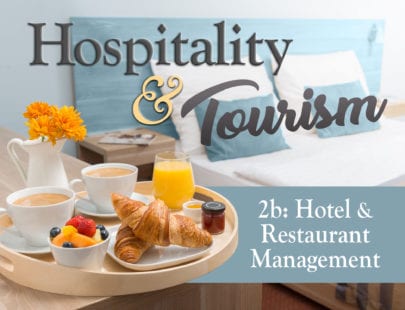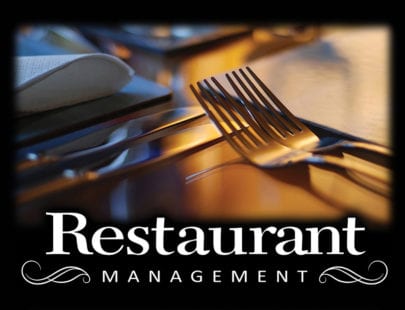
Hospitality and Tourism 2a: Hotel and Restaurant Management
Are you a people person? Then hospitality may be the field for you! Learn about what makes the hotel and restaurant industries unique. Learn about large and small restaurants, boutique and resort hotels, and their day-to-day operations. Evaluate the environment for these businesses by examining their customers and their competition. Discover trends and technology that makes each industry exciting and innovative. Explore a variety of interesting job options from Front Desk and Concierge services to Maître d and food service.
Units at a Glance
Unit 1: Knowing the Business
Planes, trains, and automobiles! These days, travel is more popular than ever, and the mind of the tourist has become increasingly sophisticated and selective. This evolution has created a whole new set of challenges for the Hospitality and Tourism industry, which prides itself on the ability to create and execute just the right experience for people looking to get away and make the most of their free time. From family vacations on the beach to trekking through the mountains of Nepal, finding the perfect escape for travelers is about understanding what they want, how they want it, and most importantly, why they want it. When these questions are answered, professionals in the industry can apply their personal best to making the most of life’s opportunities, for both the customer and themselves.
What will you learn in this unit?
- Differentiate between the hospitality and tourism industries
- Explain the impact of tourism on local, national, and global economies
- Identify key factors in the growth of tourism and their impact on the industry
- Describe how different types of attractions drive growth and contribute to industry success
Unit 2: Understanding Service
While a purist would say real hospitality comes from the heart, a pragmatist might say it actually relies on a clear set of interpersonal and professional skills. Yes, an innate sense of kindness is certainly a plus, but there are also plenty of learnable strategies available to make the role easier, more enjoyable, and entirely more effective. Identifying these various skills and how they can be honed with integrity are two of the most important first steps in the process of thinking critically about your own potential in the service field. And, in the process of learning how to make others happy, you will also likely learn a great deal about yourself and what it means to take on professional challenges with confidence, kindness, and a positive outlook.
What will you learn in this unit?
- Identify key aspects of operational and customer-based service
- Explain the requirements for establishing a strong service culture
- Describe the importance of service within the hospitality industry
- Understand and describe the interpersonal skills needed to excel in a hospitality role
Unit 3: Hotel and Lodging Operations
If you have ever stayed in a hotel, you know it can be a busy place. With so many travelers coming and going, each of whom have their own set of expectations, the demand for high-quality, effective service is endless. By looking more closely at what exactly hotel workers do and what this unique environment demands, it becomes easier to understand the many opportunities that exist within the industry. From interacting with guests to serving meals to cleaning rooms to managing financial accounts, there is no shortage of work to be done. And when it’s done right, the challenging business of keeping travelers happy can be one of the most rewarding pursuits of all. Just ask a satisfied guest!
What will you learn in this unit?
- Understand the significance of international travel in the industry
- Explain the evolution of lodging and the changing patterns of travel
- Identify the main sources of income and expense associated with lodging
- Describe the various roles within the larger environment and their importance
Unit 4: Restaurant Operations
Sure, we’ve all eaten in restaurants—but what does it take to run one? To keep diners satisfied and coming back for more? To ensure the food, atmosphere, and service is just right? It’s a complex and fascinating business, to be sure, and one that demands a comprehensive knowledge of the larger hospitality industry and how it operates. It begins with a thorough understanding of what a restaurant environment requires—the food, the people, the vision, the costs—and moves into an appreciation for the hard work and commitment it demands. A satisfying dining experience is, hands down, one of the most important jewels in the crown of service. And as such, there are a lot of different models for how it can be successfully achieved as well as a lot of pitfalls to watch out for. But once you begin to examine the many moving parts of the restaurant business, it becomes clear it is a pursuit unlike any other, filled with endless creative and professional possibilities—all of which are just waiting to be explored.
What will you learn in this unit?
- Explain the economic impact of the food service industry
- Compare and contrast different kinds of restaurant operations
- Understand the basic categories among restaurants and their appeal
- Describe the main responsibilities associated with each part of the restaurant business
Unit 5: Technology in the Industry
Hotels, restaurants, event planning, tourism, transportation—you name it, and technology has changed it. All the processes and operations the business world once relied on have now evolved into a digital framework of websites, job platforms, social media, and other networking capabilities. And together, all of these online amenities have made the H&T industry, and its many employees, a more dynamic and exciting enterprise. There has never been a better time to travel the world, enjoy a tasty dining experience, or strike out on a new adventure—which is precisely why there has also never been a better time to become part of this lively industry. And technology is here to make the process easier and more interesting than ever before.
What will you learn in this unit?
- Evaluate how technological tools improve workplace performance
- Identify current and emerging technologies to improve guest services
- Explain the various media and marketing tools used to promote H&T businesses
- Understand how certain software benefits the operational systems of the H&T industry
Unit 6: Industry Trends
Where there is business, there is excellence. This is particularly true in the world of H&T, where professionals put their mind, body, and soul into crafting some truly amazing experiences for travelers and diners around the world. By carefully interpreting various types of social, financial, and cultural trends, industry experts are able to create exactly what tourists are looking for, possibly before they even know it themselves. Although it can feel like a dream to the lucky guests who enjoy these experiences, this skill does not come from magic or luck or fairy dust—it comes from good, old-fashioned hard work, an ambitious spirit, and a big dose of creativity. And once you get a glimpse of the people and places who make this industry shine in the real world, you will never think about service the same way again.
What will you learn in this unit?
- Understand and pinpoint growing and declining trends of the H&T industry
- Explain how recent industry trends are changing the business world
- Research the labor market to find employment opportunities
- Identify some of the highly respected schools within the industry and how they drive change
Required Materials
Computer with:
-
- Internet access
- Slideshow program like Keynote or PowerPoint
- Word processing program like Microsoft Word
- Video recording device
- Digital camera, cell phone, or computer with video capabilities
- Audio recording device
- Computer, cell phone app, or handheld voice recorder
- A friend or family member to assist with various activities/labs
- A real or fake telephone to use as a prop
Optional:
(only needed if student will not create labs/activities digitally)
- Craft materials:
-
- Crayons, markers, colored pencils
- Glue
- Scissors
- Poster board or butcher paper
- Printer
-




